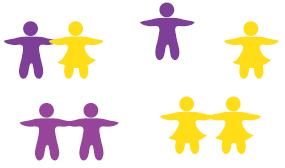During puberty, relationships with family and friends can change and new kinds of relationships begin.
Family
Your relationships with family members might change during puberty. You might start to want more independence and privacy. You will be able to make more decisions for yourself and contribute more to how your household runs. This all takes a long time to get used to, so it’s important to talk to your family about how you feel and to think about how they feel too.
Friends
Friends are people you can talk to and share your feelings and experiences with. You might sometimes fight or want to spend time apart for a while, but friends are people who make you feel good when you are with them. Your friendships will change during puberty. You might start making new friends as your interests change. You might have a best friend, or a few best friends. It’s great to have special people that you are close to, but it is important that friendships don’t stop you from making new friends or being yourself. Sometimes you may need to reduce the amount of time you spend with one person and open up your friendship to other people. It’s also OK to spend time on your own.
Attraction
During puberty you might start to be attracted to someone. Attraction is when you like someone as more than a friend or you get sexy feelings when you see or think about them.

You can be attracted to someone from the opposite sex, same sex, both sexes, or you might not be attracted to anyone.
All these forms of attraction are normal and healthy and no-one is allowed to be teased or bullied because of who they are attracted to.
New relationships
Sometimes you might become attracted to one special person. You might want to spend more time with them and get sexy feelings when you think about them. Sometimes that person will feel the same way, but sometimes they won’t. This can be hard to deal with at first, but try to remember that you are a unique person with lots of great qualities.
If two people are attracted to each other, they can decide to have a closer relationship. It’s up to you how your relationship works. Both people need to talk about how they feel, the limits of the relationship and what kinds of activities they want to do.
Even though intimate relationships can be very special, a healthy relationship doesn’t get in the way of your other relationships with friends and family. If you find that you don’t have time for other relationships you might need to think about balancing your time with different relationships.
Do you want to…?
In any relationship, it’s important that both people feel comfortable and only do things that they want to do. That’s why if you want to kiss or touch someone, you need to ask whether they want to. This is called getting consent.
You could ask things like:
- Are you comfortable?
- Do you want to go further?
- Do you want to stop?
Also let your partner know how you feel, what you like and what you don’t like.
If you don’t want to…?
You never have to kiss or touch someone if you don’t want to. If someone touches you in a way you don’t like you can tell them to stop, even if it’s someone you like.
If someone makes you uncomfortable it’s important to tell a trusted adult, or call Kids Helpline on 1800 55 1800.
If you have experienced sexual assault it’s important to tell someone. You can call the National Sexual Assault, Domestic Family Violence Counselling Service on 1800 RESPECT, 24 hours a day.
![]()


